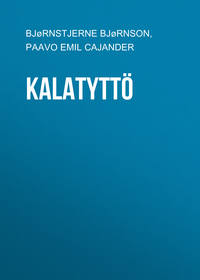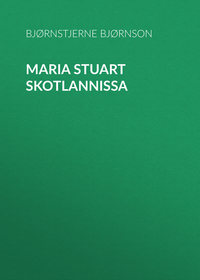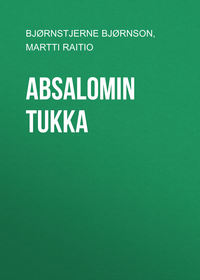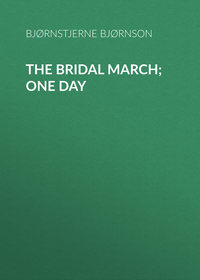 полная версия
полная версияMagnhild; Dust
There was a whirling, a raging within, a fall. But there was no explosion. On the contrary, everything became so empty, so still. A few creaking steps above, then not another sound.
Magnhild must have stood motionless for a long time. She heard some one take hold of the door-knob at last, and involuntarily she pressed both hands to her heart. Then she felt an impulse to fly; but the little fair curly head of the child, with its innocent, earnest eyes, now appeared in the opening of the door.
"Is mamma here?" the little one asked, cautiously.
"She is up-stairs," replied Magnhild, and the sound of her own voice, the very purport of the words she uttered, caused the tears to rise in her eyes and compelled her to turn her face away.
The child had drawn back its head and closed the door. Magnhild had no time to become clear in her own mind about what had occurred; for the child speedily came down-stairs again and into her room.
"Mamma is coming; she said I must wait here. Why are you crying?" But Magnhild was not crying now. She made no reply, however, to the child, who presently exclaimed: "Now mamma is coming."
Magnhild heard the lady's step on the stair, and escaped into her bedroom. She heard the interchange of words between mother and child in the adjoining room, and then to her consternation the bedroom door was opened; the lady came in. There was not the slightest trace of guilt in her eyes: they diffused happiness, warmth, candor through the whole chamber. But when her gaze met Magnhild's the expression changed, causing Magnhild to drop her eyes in confusion.
The lady advanced farther into the room. She placed one hand on Magnhild's waist, the other on her shoulder. Magnhild was forced to raise her eyes once more and met a grieved smile. This smile was also so kind, so firm, and therefore so persuasive, that Magnhild permitted herself to be drawn forward, and presently she was kissed – softly at first, as though she were merely fanned by a gentle breath, while that unknown perfume which always accompanied the lady encompassed them both, and the rustle of the silk dress was like a low whisper; then vehemently, while the lady's bosom heaved and her breath was deeply drawn as from some life-sorrow.
After this, utter silence and then a whispered: "Come now!" She went on in advance, leading Magnhild by the hand. Magnhild was a mere child in experience. With contending emotions she entered the pretty little cottage occupied by the lady, and was soon standing in the midst of open trunks and a wardrobe scattered through two rooms.
The lady began a search in one of the trunks, from which she rose with a white lace neckerchief in her hand, saying: "This will suit you better than the one you have on, for that is not at all becoming," and taking off the one Magnhild wore, she tied on the other in a graceful bow, and Magnhild felt herself that it harmonized well with her red dress.
"But how have you your hair? You have an oval face and your hair done up in that way? No" – and before Magnhild could offer any resistance she was pressed down into a chair. "Now I shall" – and the lady commenced undoing the hair. Magnhild started up, fiery red and frightened, and said something which was met with a firm: "Certainly not!"
It seemed as though a strong will emanated from the lady's words, arms, fingers. Magnhild's hair was unfastened, spread out, brushed, then drawn loosely over the head and done up in a low knot.
"Now see!" and the mirror was held up before Magnhild.
All this increased the young woman's embarrassment to such a degree that she scarcely realized whose was the image in the glass. The elegant lady standing in front of her, the delicate perfume, the child at her knee who with its earnest eyes fixed on her said, "Now you are pretty!" – and the guest at the opposite window who at this moment looked down and smiled. Magnhild started up, and was about to make her escape, but the lady only threw her arms around her and drew her farther into the room.
"Pray, do not be so bashful! We are going to have such a nice time together;" and once more her attention was full of that sweetness the like of which Magnhild had never known. "Run over now after your hat and we will start!"
Magnhild did as she was bid. But no sooner was she alone than a sense of oppression, a troubled anxiety, wrung her heart, and the lady seemed detestable, officious; even her kindness was distorted into a lack of moderation; Magnhild failed to find the exact word to express what distressed her.
"Well? Are you not coming?"
These words were uttered by the lady, who in a jaunty hat, with waving plume, beamed in through the window. She tossed back her curls, and drew on her gloves. "That hat becomes you very well indeed," said she. "Come now!"
And Magnhild obeyed.
The little girl attached herself to Magnhild.
"I am going with you," said she.
Magnhild failed to notice this, because she had just heard steps on the stairs. Tande, the composer, was coming to join them.
"How your hand trembles!" cried the little one.
A hasty glance from the lady sent the hot blood coursing up to Magnhild's neck, cheeks, temples – yet another from Tande, who stood on the door-steps, not wholly free from embarrassment, and who now bowed.
"Are we going up in the wood?" asked the little girl, clinging tightly to Magnhild's hand.
"Yes," replied the lady; "is there not a path across the fields behind the house?"
"Yes, there is."
"Then let us go that way."
They went into the house again, and passed out of the back door, through the garden, across the fields. The wood lay to the left of the church, and entirely covered the plain and the tower mountain slopes. Magnhild and the child walked on in advance; the lady and Tande followed.
"What is your name?" asked the little girl.
"Magnhild."
"How funny, for my name is Magda, and that is almost the same." Presently she said: "Have you ever seen papa in uniform?"
No, Magnhild never had.
"He is coming here soon, papa is, and I will ask him to put it on."
The little girl continued to prattle about her papa, whom she evidently loved beyond all else upon earth. Sometimes Magnhild heard what she was saying, sometimes she did not hear. The pair walking behind spoke so low that Magnhild could not distinguish a single word they were saying although they were quite near. Once she gave a hasty glance back and observed that the lady's expression was troubled, Tande's grave.
They reached the wood.
"Just see! here at the very edge of the wood is the most charming spot in the world!" exclaimed the lady, and now she was radiant again, as though she had never known other than the most jubilant mood. "Let us sit down here!" and as she spoke she threw herself down with a little burst of delight and a laugh. Tande seated himself slowly and at a little distance, Magnhild and the child took their seats opposite the pair.
The little one sprang directly to her feet again, for her mother wanted flowers, grass, ferns, and moss, and began to bind them at once into nosegays when they were brought to her. It was evidently not the first time Magda had made collections of the kind for her mother, for the child knew every plant by name, and came running up to the group with exclamations of delight whenever she found anything her mother had not yet noticed but which she knew to be a favorite of hers.
Various topics were brought forward, some of which, although not all, were dwelt upon by Tande, who had stretched himself out on the grass and seemed inclined to rest; but from the moment an affair of recent occurrence was mentioned, concerning a wife who had forsaken her husband, and had eventually been cast off by her lover, he took zealous part, severely censuring the lover, for whom Fru Bang made many excuses. It was absurd, she said, to feign an affection which no longer existed. But at least it was possible to act from a sense of duty, Tande insisted. Ah, to duty they had bid farewell, the lady remarked softly, as she busied herself in decking Magda's hat with flowers.
Further conversation incidentally revealed that Fru Bang had been in the habit of mingling in the first circles of the land; that she had traveled extensively, and evidently had means to live where and how she pleased. And yet here she sat, full of thoughtful care for Magnhild, for Tande, for the child. She had a kindly word for everything that was mentioned; her fancy invested the most trifling remark with worth, just as she made the blades of grass she was putting into her nosegay appear to advantage, and managed so that not one of them was lost.
Tande's long pale face, with its marvelously beautiful smile, and the soft hair falling caressingly, as it were, about it, had gradually become animated.
The glowing, richly-tinted woman at his side was part of the world in which he lived and composed.
The spot on which they sat was surrounded by birch and aspen. The fir was not yet able to gain the mastery over these, although its scions had already put in an appearance. While such were the case grass and flowers would flourish – but no longer.
CHAPTER VI
Magnhild awoke the next day, not to joyous memories such as she had cherished every morning during the past few weeks. There was something to which she must now rise that terrified her, and, moreover, grieved her. Nevertheless it attracted her. What should she pass through this day?
She had slept late. As she stepped into the sitting-room, she saw Fru Bang at the open window opposite, and was at once greeted with a bow and a wave of the hand. Then a hat was held up and turned round. Very soon Magnhild was so completely under the spell of the lady's kind-hearted cordiality, beauty, and vivacity that her school hour was nearly forgotten.
She was met by a universal outcry when she appeared at the school with her hair done up in a new style, and wearing a new hat and a white lace neckerchief over her red dress! Magnhild had already felt embarrassed at the change, and now her embarrassment increased. But the genuine, hearty applause that arose from many voices speedily set her at her ease, and she returned home in a frame of mind similar to that of a public officer whose rank had been raised one degree.
The weather was fine as on the preceding day. A little excursion was therefore decided on for the afternoon. In the forenoon Tande played. All the windows in the neighborhood were open, and Fru Bang sat in hers and wept. Passers-by stared at her; but she heeded them not. There was something passionately intense and at times full of anguish in his playing to-day. Magnhild had never before heard him give vent to such a mood. Perhaps he, too, felt it to be a strange bewilderment; for rousing himself he now conjured up a wealth of bright, glittering bits of imagery which blended into the sunshine without and the buzzing of the insects. This dewy summer day became all at once teeming with discoveries; in the street, now parched and dry, the particles of dust glittered, over the meadows quivered the varied tints of green where the aftermath had sprung up, and of yellow and brown where it had not yet made its appearance. There was everywhere an intermingling of gold, red, brown, and green in the play of the forest hues. The loftiest pinnacle of the mighty mountain chair had never been more completely bathed in blue. It stood out in bold relief against the glowing grayish tone in the jagged cliffs about the fjord. The music grew more calm; pain was uppermost again, but it was like an echo, or rather it seemed as though it were dissolved into drops which ever and anon trickled down into the sunny vigor of the new mood. The lady opposite bowed forward until her head rested on her arm, and her shoulders quivered convulsively. Magnhild beheld this, and drew back. She did not like such an exposure.
On the excursion that afternoon it again fell to Magnhild's lot to take the lead with the child; the other two came whispering after them. They found to-day a new tarrying-place, a short distance farther up the mountain than where they had assembled the previous day; – the lady had been weeping; Tande was silent, but he appeared even more spiritual than usual.
The conversation this time centred in the fjord scenery of Norway, and the depressing influence it must necessarily have on the mind to be so completely shut in by mountains. The various barriers in the spiritual life of the people were named; old prejudices, established customs, above all those regulations of the church which had became mere empty forms, hypocrisy, too, were all reviewed in the most amusing manner; the infinite claims of love, however, were freely conceded.
"See, there she is sitting with her forefinger in her mouth again," laughed the lady; this greatly startled Magnhild, and created a fresh flow of merriment.
A little while after this Magnhild permitted her hair to be decked by Magda with flowers and grass. She hummed softly to herself all the while, a habit she had acquired during the days when she was practicing reading notes at the parsonage. This time her irregular song took higher flights than usual, inasmuch as thoughts filled it, just as the wind inflates a sail. The higher she sang, the stronger her voice became, until Magda exclaimed: —
"There comes mamma."
Magnhild was silent at once. True enough there came the lady, and directly following her Tande.
"Why, my child, do you sing?"
In the course of the day they had fallen into the habit of using the familiar "du;" that is, Fru Bang used it, but Magnhild could not do so.
"That is the highest, clearest soprano I have heard for some time," said Tande, who now drew near, and who was flushed from having taken a few steps at a more rapid pace than usual.
Magnhild sprang to her feet, so hastily that there fell a shower of flowers and grass to the ground, at the same time putting up her hands to remove Magda's adornments from her hair, which called forth a bitter complaint from the little girl. Tande's words, appearance, and the look he now fastened on her had embarrassed Magnhild, and Fru Bang displayed most kindly tact in endeavoring, as it were, to shield her young friend.
It was not long before they were on their way home, – and they went at once to Tande's room to try Magnhild's voice.
Fru Bang stood holding her hand. Magnhild sang the scale, and every note was so firm and true that Tande paused and looked up at her. She was then obliged to admit that she had sung before.
A feeling of happiness gradually took possession of her; for she was appreciated, there could be no mistake about it. And when a little two-part song was brought forward and Magnhild proved able to sing the soprano at sight, and then a second one was tried and a third, such joy reigned in the little circle that Magnhild gained inspiration, which gave her a beauty she had never possessed at any previous moment of her life.
Fru Bang had a fine alto; her voice was not so cultivated as it was sympathetic; nor was it strong, but for this reason it was all the better suited to Magnhild's voice, for although the latter doubtless was stronger, Magnhild had never been accustomed to letting out its full strength, nor did she do so now.
As they gradually became more acquainted with the songs, Tande kept adding to the richness and fullness of the piano – the accompaniments.
The street had become crowded with people; such music had never been heard before in the little town. It was evident that a swarm of new ideas were let loose upon those heads. The thoughts and words of the ensuing evening were no doubt more refined than usual. Upon the children there surely dawned a foreboding of foreign lands. A drizzling rain was falling, the crests of the lofty mountains on both sides of the valley and surrounding the fjord were veiled, but towered up all the higher in fancy. The glorious forest hues, the placid surface of the fjord, now darkened by the rain, the fresh aftermath of the meadows, and not a disturbing sound save from the turbulent stream. Even if a wagon came along, it paused in front of the house.
The silence of the multitude without harmonized with the mood of those within.
When the singing at length ended, Tande said that he must devote an hour each day to instructing Magnhild how to use her voice, so that she could make further progress alone when he and Fru Bang were gone. Moreover, they must continue the duet singing, for this was improving to the taste. Fru Bang added that something might be made of that voice.
Tande's eyes followed Magnhild so searchingly that she was glad when it was time to take leave.
She forgot some music she had brought with her, and turning went back after it. Tande was standing by the door. "Thanks for your visit!" he whispered, and smiled. This made her stumble on the threshold, and overwhelmed with confusion, she came near making a misstep at the head of the stairs. She entered her sitting-room in great embarrassment. Fru Bang, who was still there waiting to say "Good-night!" looked at her earnestly. It was some time before she spoke, and then the greeting was cold and absent-minded. She turned, however, before she had proceeded many steps, and descrying Magnhild's look of surprise, sprang back and clasped her in a fervent embrace.
At no very remote period there had been an evening which Magnhild had thought the happiest of her life. But this —
When steps were again heard above she trembled in every fibre of her body. She could see Tande's expression, as he raised his eyes while playing. The diamond, cutting brilliant circles of light over the keys of the piano, the blue-veined hands, the long hair which was continually falling forward, the fine gray suit the musician wore, his silent demeanor, – all dissolved into the melodies and harmonies, and with them became blended his whispered "Thanks for your visit!"
At the cottage across the street it was dark.
Magnhild did not seek her couch until midnight, and then not to sleep; nor did he who was above sleep; on the contrary, just as Magnhild had retired he began to play. He struck up a melancholy, simple melody, in the form of a soprano solo at first, and finally bursting into what sounded like a chorus of female voices; his harmonization was exquisitely pure. Without being conscious herself of the transition of thought, Magnhild seemed to be sitting on the hill-side on the day of her confirmation, gazing at the spot where her home had stood. All her little brothers and sisters were about her. The theme was treated in a variety of ways, but always produced the same picture.
At school the next morning Magnhild was accosted with many questions concerning the preceding evening; among other things whether she had really taken part in the singing, what they had sung, about the other two, and whether they would sing often.
The questions filled her with joy: a great secret, her secret, was in its innermost depths. She felt conscious of strange elasticity. She had never made such haste home before. She was looking forward to singing with him again in the forenoon!
And she did sing. Tande sent word down by the sailor's wife that he expected her at twelve o'clock. A little before this hour she heard once more that melancholy, pure composition of yesterday.
Tande met her without a word. He merely bowed and went straight to the piano and then turned his head as before to bid her draw nearer. She sang scales, he gave suggestions as a rule without looking at her; the whole hour passed as a calm matter of business; she was thankful for this.
From her lesson she crossed the street to the lady. Fru Bang sat, or rather reclined, on the sofa, with an open book on her lap, and with Magda, to whom she was talking, in front of her. She was grave, or rather sorrowful; she looked up at Magnhild, but went on talking with the child, as though no one had entered. Magnhild remained standing, considerably disappointed. Then the lady pushed aside the child and looked up again.
"Come nearer!" said she, feebly, and made a motion with the hand that Magnhild did not understand.
"Sit down there on the footstool, I mean."
Magnhild obeyed.
"You have been with him?" Her fingers loosened Magnhild's hair as she spoke. "The knot is not quite right," – then with a little caress, "You are a sweet child!"
She sat up now, looked Magnhild full in the eyes, gently raising her friend's head as she did so.
"I have resolved to make you pretty, prettier than myself. Do you see what I have bought for you to-day?"
On the table behind Magnhild lay the materials for a summer costume.
"This is for you, it will be becoming."
"But, dear lady!"
"Hush! Not a word, my friend! I am not happy unless I can do something of the kind – and, in this case, I have my own reasons into the bargain."
Her large, wondrous eyes seemed to float away in dreams.
"There, that will do!" said she, and rose hastily.
"Now we will dine together; but first we must have a short stroll, and in the afternoon a long stroll, and then we will have some singing and afterwards a delightful siesta; that is what he likes!"
But neither short nor long stroll was accomplished, for it rained. So the lady busied herself with cutting out Magnhild's dress; it was to be made in the neighborhood after Fru Bang's own pattern.
They sang together, and even longer than on the preceding day. A supply of songs for two voices was telegraphed for; a few days later the package arrived. During the days which followed most of the songs were gone through with the utmost accuracy. Every day Magnhild had her regular lesson. Tande entered into it with the same business-like silence as on the first day. Magnhild gained courage.
Wonderful days these were! Song followed upon song, and these three were continually together, chiefly at the lady's, where they most frequently both dined and supped. One day Fru Bang would be in the most radiant mood, the next tormented with headache, and then she would have a black, red, and brown kerchief tied like a turban, about her head, and would sit or recline on the sofa, in languid revery.
As they were thus assembled together one day, and Magda stood at the window, the little one said, —
"There goes a man into your house, Magnhild: he is lame."
Magnhild sprang up, very red.
"What is it?" asked Fru Bang, who was lying on the sofa with a headache, and had been talking in a whisper with Tande.
"Oh! it is" – Magnhild was searching for her hat; she found it and withdrew. From the open window she heard the child say: "A lame, ugly man, who" —
Skarlie was working this year on the sea-coast. A foreign ship had been wrecked there Skarlie and some men in Bergen had bought it; for they could repair it at a much less outlay than had originally been estimated. They had made an uncommonly good bargain. Skarlie supervised the carpentering, painting, and leather work of refitting the vessel. He had come home now after a fresh supply of provisions for the workmen.
His surprise on entering his house was not small. Everything in order! And the room filled with a pleasant perfume. Magnhild came – it was a lady who stood before him. Her whole countenance was changed. It had opened out like a flower, and the soft, fair hair floating about neck and drooping shoulders threw a lustre over head and form. She paused on the threshold, her hand on the door-knob. Skarlie had seated himself in the broad chair in the corner, and was wiping the perspiration from his bald head. As soon as his first astonishment was over, he said: "Good-day!"
No reply. But Magnhild came in now, and closed the door after her.
"How fine it looks here," said he. "Is it your lodger" —
He puckered up his lips, his eyes grew small. Magnhild looked at him coldly. He continued more good-naturedly, —
"Did he make your new dress, too?"
Now she laughed.
"How are you getting on?" she asked, presently.
"I am nearly through."
He had acquired the comfortable air of a man who is conscious of doing well in the world.
"It is warm here," said he; the sun had just burst forth after a long rain, and was scorching, as it can be only in September. He stretched out his legs, as far as the crooked one permitted, and lay back, letting his large hands hang down over the arms of the chair, exact pictures of the web-feet of some sea-monster.









